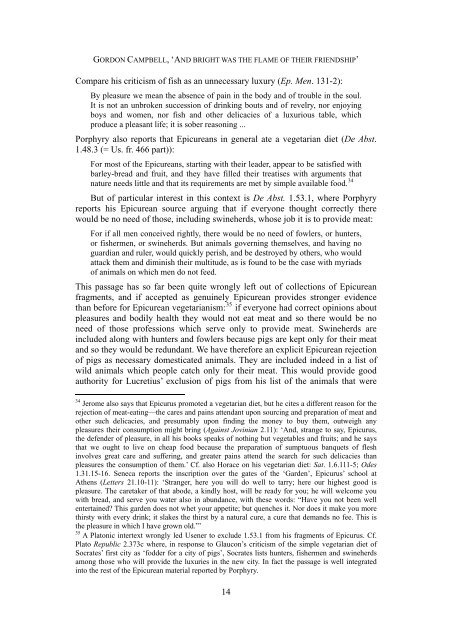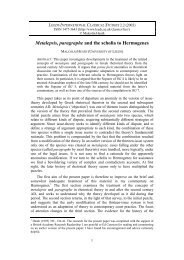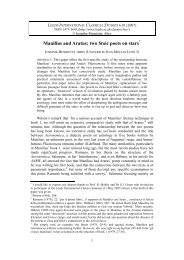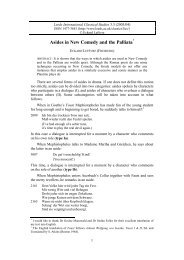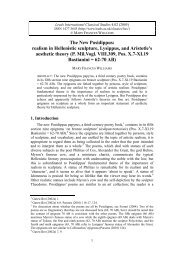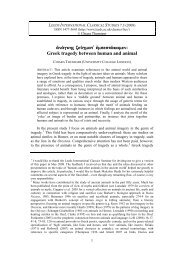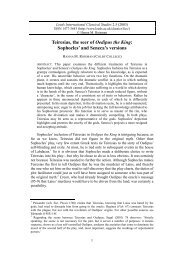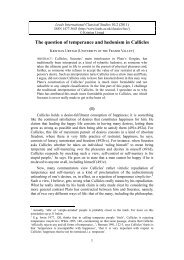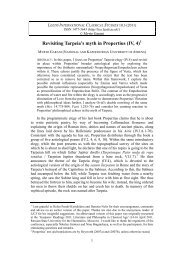'And bright was the flame of their friendship' - Leeds International ...
'And bright was the flame of their friendship' - Leeds International ...
'And bright was the flame of their friendship' - Leeds International ...
Create successful ePaper yourself
Turn your PDF publications into a flip-book with our unique Google optimized e-Paper software.
GORDON CAMPBELL, ‘AND BRIGHT WAS THE FLAME OF THEIR FRIENDSHIP’<br />
Compare his criticism <strong>of</strong> fish as an unnecessary luxury (Ep. Men. 131-2):<br />
By pleasure we mean <strong>the</strong> absence <strong>of</strong> pain in <strong>the</strong> body and <strong>of</strong> trouble in <strong>the</strong> soul.<br />
It is not an unbroken succession <strong>of</strong> drinking bouts and <strong>of</strong> revelry, nor enjoying<br />
boys and women, nor fish and o<strong>the</strong>r delicacies <strong>of</strong> a luxurious table, which<br />
produce a pleasant life; it is sober reasoning ...<br />
Porphyry also reports that Epicureans in general ate a vegetarian diet (De Abst.<br />
1.48.3 (= Us. fr. 466 part)):<br />
For most <strong>of</strong> <strong>the</strong> Epicureans, starting with <strong>the</strong>ir leader, appear to be satisfied with<br />
barley-bread and fruit, and <strong>the</strong>y have filled <strong>the</strong>ir treatises with arguments that<br />
nature needs little and that its requirements are met by simple available food. 34<br />
But <strong>of</strong> particular interest in this context is De Abst. 1.53.1, where Porphyry<br />
reports his Epicurean source arguing that if everyone thought correctly <strong>the</strong>re<br />
would be no need <strong>of</strong> those, including swineherds, whose job it is to provide meat:<br />
For if all men conceived rightly, <strong>the</strong>re would be no need <strong>of</strong> fowlers, or hunters,<br />
or fishermen, or swineherds. But animals governing <strong>the</strong>mselves, and having no<br />
guardian and ruler, would quickly perish, and be destroyed by o<strong>the</strong>rs, who would<br />
attack <strong>the</strong>m and diminish <strong>the</strong>ir multitude, as is found to be <strong>the</strong> case with myriads<br />
<strong>of</strong> animals on which men do not feed.<br />
This passage has so far been quite wrongly left out <strong>of</strong> collections <strong>of</strong> Epicurean<br />
fragments, and if accepted as genuinely Epicurean provides stronger evidence<br />
than before for Epicurean vegetarianism: 35 if everyone had correct opinions about<br />
pleasures and bodily health <strong>the</strong>y would not eat meat and so <strong>the</strong>re would be no<br />
need <strong>of</strong> those pr<strong>of</strong>essions which serve only to provide meat. Swineherds are<br />
included along with hunters and fowlers because pigs are kept only for <strong>the</strong>ir meat<br />
and so <strong>the</strong>y would be redundant. We have <strong>the</strong>refore an explicit Epicurean rejection<br />
<strong>of</strong> pigs as necessary domesticated animals. They are included indeed in a list <strong>of</strong><br />
wild animals which people catch only for <strong>the</strong>ir meat. This would provide good<br />
authority for Lucretius’ exclusion <strong>of</strong> pigs from his list <strong>of</strong> <strong>the</strong> animals that were<br />
34 Jerome also says that Epicurus promoted a vegetarian diet, but he cites a different reason for <strong>the</strong><br />
rejection <strong>of</strong> meat-eating—<strong>the</strong> cares and pains attendant upon sourcing and preparation <strong>of</strong> meat and<br />
o<strong>the</strong>r such delicacies, and presumably upon finding <strong>the</strong> money to buy <strong>the</strong>m, outweigh any<br />
pleasures <strong>the</strong>ir consumption might bring (Against Jovinian 2.11): ‘And, strange to say, Epicurus,<br />
<strong>the</strong> defender <strong>of</strong> pleasure, in all his books speaks <strong>of</strong> nothing but vegetables and fruits; and he says<br />
that we ought to live on cheap food because <strong>the</strong> preparation <strong>of</strong> sumptuous banquets <strong>of</strong> flesh<br />
involves great care and suffering, and greater pains attend <strong>the</strong> search for such delicacies than<br />
pleasures <strong>the</strong> consumption <strong>of</strong> <strong>the</strong>m.’ Cf. also Horace on his vegetarian diet: Sat. 1.6.111-5; Odes<br />
1.31.15-16. Seneca reports <strong>the</strong> inscription over <strong>the</strong> gates <strong>of</strong> <strong>the</strong> ‘Garden’, Epicurus’ school at<br />
A<strong>the</strong>ns (Letters 21.10-11): ‘Stranger, here you will do well to tarry; here our highest good is<br />
pleasure. The caretaker <strong>of</strong> that abode, a kindly host, will be ready for you; he will welcome you<br />
with bread, and serve you water also in abundance, with <strong>the</strong>se words: “Have you not been well<br />
entertained? This garden does not whet your appetite; but quenches it. Nor does it make you more<br />
thirsty with every drink; it slakes <strong>the</strong> thirst by a natural cure, a cure that demands no fee. This is<br />
<strong>the</strong> pleasure in which I have grown old.”’<br />
35 A Platonic intertext wrongly led Usener to exclude 1.53.1 from his fragments <strong>of</strong> Epicurus. Cf.<br />
Plato Republic 2.373c where, in response to Glaucon’s criticism <strong>of</strong> <strong>the</strong> simple vegetarian diet <strong>of</strong><br />
Socrates’ first city as ‘fodder for a city <strong>of</strong> pigs’, Socrates lists hunters, fishermen and swineherds<br />
among those who will provide <strong>the</strong> luxuries in <strong>the</strong> new city. In fact <strong>the</strong> passage is well integrated<br />
into <strong>the</strong> rest <strong>of</strong> <strong>the</strong> Epicurean material reported by Porphyry.<br />
14


